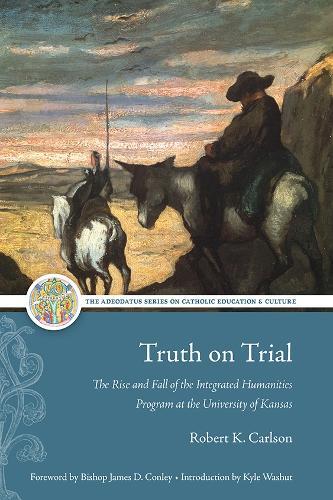Overview
In this reprinting of Truth on Trial, Robert Carlson outlines the sad state of higher education in America, where ""learning"" is increasingly disconnected from the pursuit of truth, goodness, and beauty that has always been its most important heritage, replaced by an environment where any view that is not ‘politically correct’ is persecuted and disdained. Drawing upon his own experiences in the transformational Integrated Humanities Program (IHP) at the University of Kansas (KU), Carlson details the crisis that faces education today, and uses the lessons learned through that program’s meteoric rise (and eventual demise) to propose a solution to that same crisis. Launching in the early 1970’s, the IHP was the ""Great Books"" brainchild of a trio of KU professors—Dennis Quinn, Franklyn Nelick, and John Senior—who understood that wonder is not only the beginning but also the sustaining principle of the best education, and who sought to offset the radical disintegration permeating Western culture in general and higher education in particular. Convinced that the fragmentation of such major cultural institutions as the family, the church, and the world of education was profoundly affecting students, these three teachers invited freshmen and sophomores at the public university to join their fledgling program, where they would study, hear, and discuss the classics of ancient and medieval literature, listen to their professors converse on ""the greatest that has been thought and said,"" memorize poems, stargaze, take courses in Latin and rhetoric, and much more. The program’s growth was immediate and rapid—student enrollment increased from 20 in 1970 to 140 in 1971, and 186 in 1972—but its counter-cultural stance put it on fragile ground at KU, and within a year, it was under intense scrutiny, culminating in a public, quasi-judicial proceeding in which a dean-appointed committee sought to determine whether the IHP should continue to exist. Quinn, Nelick, and Senior, professors with a combined total of 90 years in teaching, were now on trial at the university, not because they had taught poorly, but because they had taught too well. On January 20, 1979, the Advisory Committee charged with investigating the Program rendered its verdict, placing it under the administration of a new Humanities Committee, effectively annihilating the IHP. While its initial trial felt like a defeat, God had other plans in store. Thankfully (and to paraphrase Twain’s famous words), the effects of the IHP’s death were greatly exaggerated. In the years since its untimely demise on the KU campus, its impact on the world of Catholic education has only grown stronger—the fruitfulness of its alumni and friends serving as the ultimate proof of its vision’s great worth. Since the program’s closing in 1979, it has inspired the founding of both Clear Creek Abbey and Wyoming Catholic College, as well as St. Gregory’s Academy in Pennsylvania (which eventually led to Gregory the Great Academy), and St. Martin’s Academy in Kansas. Perhaps most tellingly of all, its clear call to make wonder, beauty, and experience vital parts of any educational program has impacted countless homeschooling families, private and public school teachers, and educational programs in the subsequent years.
Full Product Details
Author: Robert K. Carlson ,
James D. Conley ,
Kyle Washut
Publisher: The Catholic University of America Press
Imprint: The Catholic University of America Press
ISBN: 9781949822588
ISBN 10: 1949822583
Pages: 230
Publication Date: 21 November 2025
Audience:
Professional and scholarly
,
Professional & Vocational
Format: Paperback
Publisher's Status: Forthcoming
Availability: Not yet available

This item is yet to be released. You can pre-order this item and we will dispatch it to you upon its release.
Author Information
Himself an attendee the University of Kansas’s Integrated Humanities Program (IHP), Dr. Robert Carlson was a student and friend of John Senior, as well as the Founding Dean of Wyoming Catholic College (WCC) and the writer of its Philosophical Vision Statement, a brilliant expression of the IHP approach to education. In addition to Alice von Hildebrand’s original forward, this edition features a new forward by Bishop James Conley, head of the Diocese of Lincoln, and an alumni (and convert) of the IHP, a preface from Professor Kyle Washut, President of WCC, an account of the founding of WCC (and of how the IHP’s vision and alumni influenced that founding), and WCC’s Philosophical Vision Statement, penned by Carlson himself in the early stages of the College’s founding.



